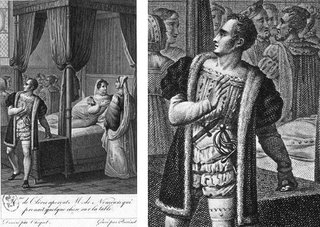20. Madame de La Fayette - Princesse de Cleves (1678)

Buy it
At Amazon UK or US.
Review
Francisco: Here's a book I really enjoyed, it's short and sweet, focuses on the main plot for the most part and is a pretty good reconstructive historical novel. The story is set 100 years in the past with the title character as the focus of the story. This book actually marks quite an evolution from previous novels as it is mainly a psychological novel, meaning that the events aren't nearly as important as the thoughts and feelings of the main characters.
This simple innovation is actually quite meaningful, and it is something that the English could not achieve until later on, and it has always remained a French speciality to write novels about feelings and not events. Not that events and setting are meaningless here, in fact the historical reconstruction of Henry II's court in France is quite a perfect one and La Fayette drew from a great number of sources to be able to achieve it.
I would definitely reccomend it, particularly to the English speaking audience who hasn't come across it. If you are stuck with Aphra Bhen's Oroonoko as an example of 17th century female writing, you are in the fucking stone-age when compared to this in terms of character development and emotional complexity.
Vanda: That was beautiful! Really, truly beautiful. I'm actually surprised to no end; after the books that came before, I was not expecting such emotional and intellectual complexity (sure, D. Quixote was fantastic, but a completly different kettle of fish).
Most of the fascinating passages here happen when characters reflect on their emotions, and believe me, it's more interesting than it sounds. The plot is very, very simple, but not simplistic. It's also beautifully written, with depth, excellent pacing, and thoughtfulness.
I have to admit to the urge of screaming at the Princess a bit towards the end, but the fact that Madame de La Fayette did not go for the obvious ending makes this a superior book. It's truly wonderful. Read it.
Final Grade
Francisco: 9/10
Vanda: 9/10
Trivia
From Wikipedia:
Popular reception
The novel was an enormous commercial success at the time of its publication, and would-be readers outside of Paris had to wait months to receive copies. The novel also sparked several public debates, including one about its authorship, and another about the sensibility of the Princess' decision to confess her adulterous feelings to her husband.
Influence
One of the earliest psychological novels which is also the first roman d'analyse (novel of analysis), La Princesse de Clèves marked a major turning point in the history of the novel, which to that point had largely been used to tell romances, implausible stories of heroes overcoming odds to find a happy marriage, with myriad subplots and running ten to twelve volumes. La Princesse de Clèves turned that on its head with a highly realistic plot, introspective language that explored the characters' inner thoughts and emotions, and no major subplots.

2 Comments:
At 1:40 PM, Roo said…
Roo said…
Did you know that you could be earning money by providing links to amazon on your reviews, they'll even provide you with a little graphic window too! Go look at the amazon associates program!
Nice reviews by the way!
At 6:55 PM, Francisco Silva said…
Francisco Silva said…
Err, I do! Right there on the top, after the picture!
And thanks!
Post a Comment
<< Home